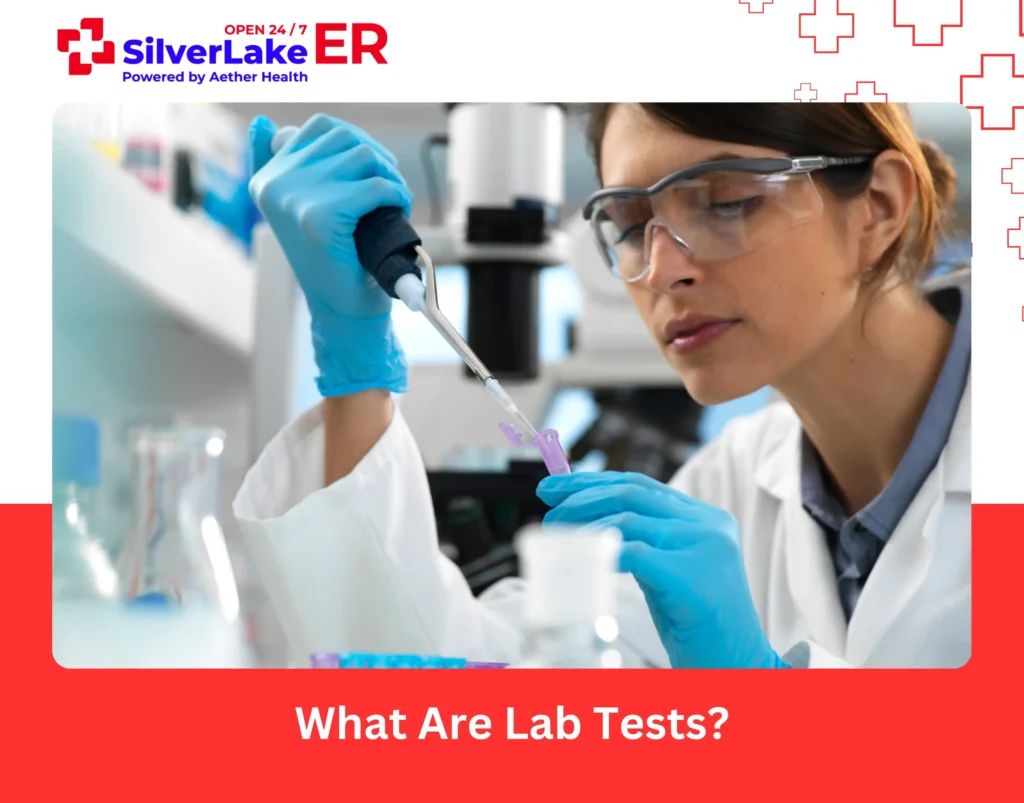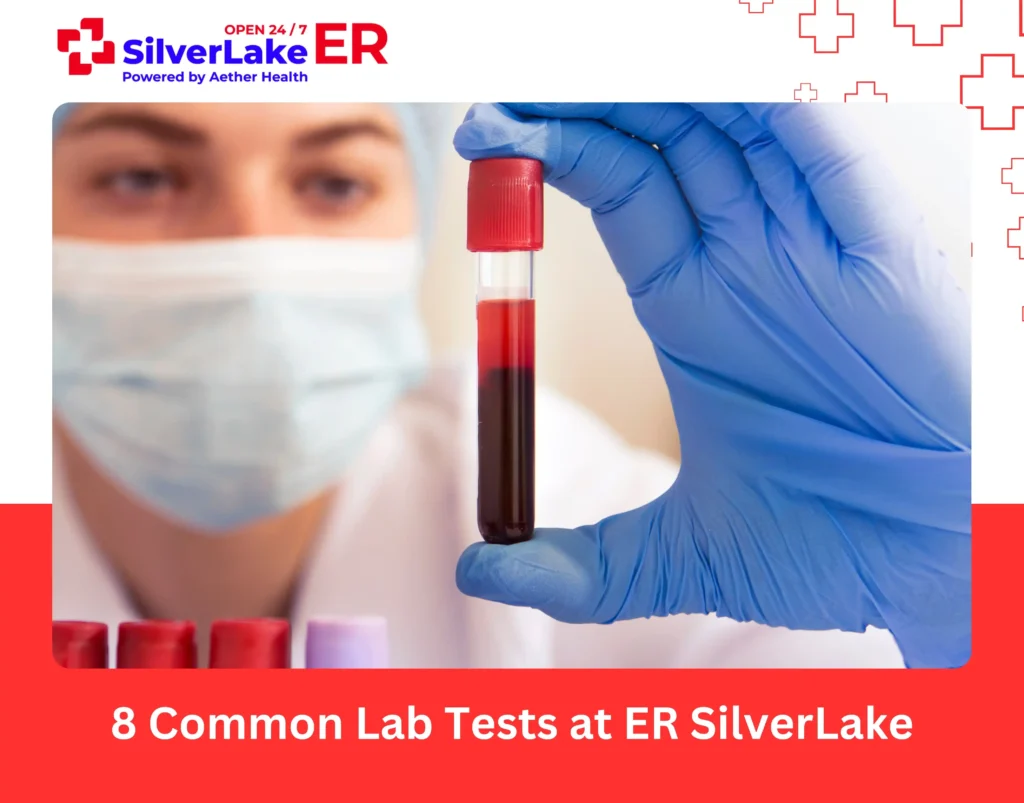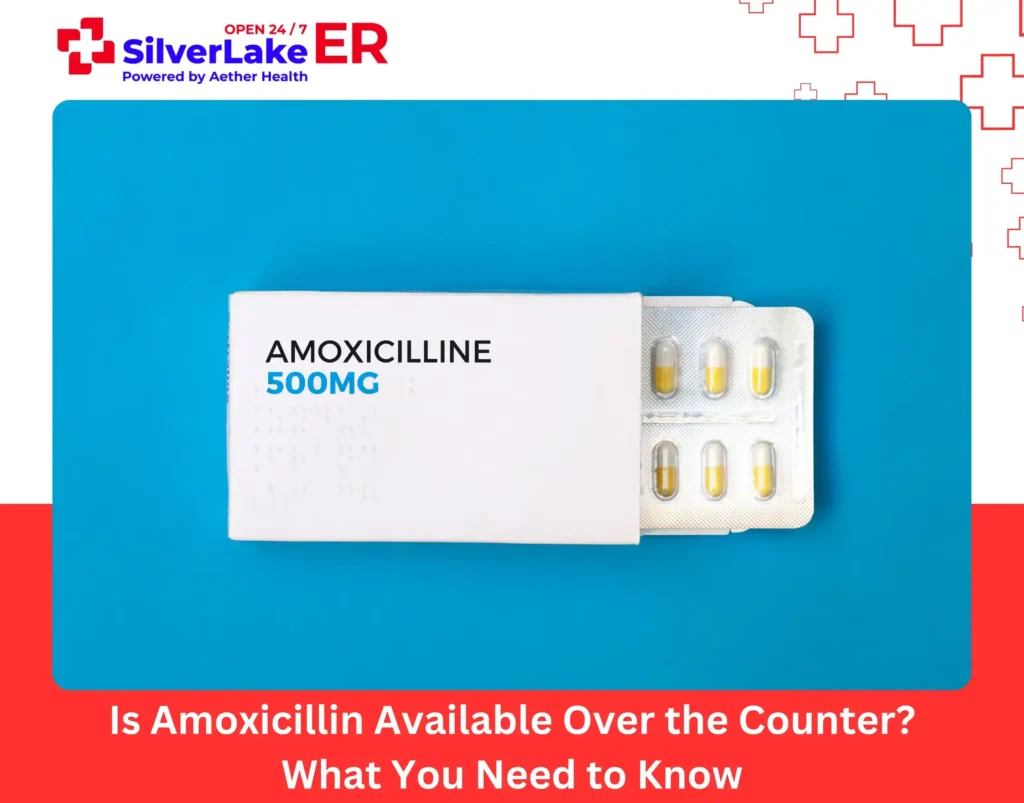Every day in our emergency room at Silverlake, we see patients seeking answers about their health. While our regular checkups and physical exams provide important clues, lab tests reveal the complete picture. These tests guide up to 70% of medical decisions, making them vital for proper treatment.
Our on-site laboratory delivers rapid results for common lab tests 24/7. This means faster answers and quick treatment during emergencies. Here’s a look at our essential lab tests and what they reveal about your health.
What Are Lab Tests?

Lab tests reveal hidden illnesses and deficiencies in your body. By analyzing samples of your blood, urine, or tissue, we can spot infections, measure organ function, and identify potential emergencies before they become critical.
Time matters in the ER. On-site lab tests at Silverlake ER transform vague symptoms into clear diagnoses, so we can start the right treatment immediately. Let’s look at eight common lab tests we use and how they guide our medical decisions with precision.
8 Common Lab Tests at ER SilverLake

The most common lab tests that we frequently use in our emergency room include:
1. Complete Blood Count (CBC)
Doctors at SilverLake ER usually recommend CBS if you have weakness, fatigue, fever, bruising, or excessive bleeding. A CBC measures the blood cells; red blood cells, white blood cells, mean corpuscular volume (MCV), hematocrit, and platelets to check:
- Infections: High white blood cell (WBC) counts signal the body is fighting off bacteria, viruses, or other invaders.
- Anemia: Low red blood cell (RBC) counts or hemoglobin levels indicate a lack of oxygen in your blood. Iron deficiency or a chronic illness is the cause.
- Bleeding or Clotting Issues: Low levels of platelets can cause excessive bleeding. High levels can cause too much clotting, which can cause heart attack, stroke, and organ damage.
2. Basic Metabolic Panel (BMP)
We run these tests if you’re dehydrated, disoriented, or dealing with nausea, vomiting, or irregular heartbeat. A basic metabolic panel (BMP) measures eight substances in your blood: glucose, calcium, sodium, potassium, carbon dioxide, chloride, blood urea nitrogen (BUN), and creatinine. The amount of these chemicals reveals:
- Electrolyte Imbalances: Levels of sodium, potassium, and chloride show how well your body regulates hydration and nerve function.
- Kidney Function: High creatinine or blood urea nitrogen (BUN) may indicate kidney damage or dysfunction.
- Blood Sugar Levels: High or low glucose levels can indicate diabetes or other issues. Glucose measurements help diagnose and manage diabetes.
3. Comprehensive Metabolic Panel (CMP)
CMP does everything the BMP does but adds liver function tests. The additional elements it measures are:
- Bilirubin: A by-product of the body’s process for recycling old red blood cells. Its high levels can lead to jaundice and other liver problems.
- Albumin: The liver makes this protein. Low levels can lead to swelling (edema) and may signal liver disease, malnutrition, or kidney problems.
- Globulins: An important part of your immune system
- Liver Enzymes (ALP, ALT, AST): If they’re too high, it could mean your liver is inflamed or damaged, or there might be an issue with your bile ducts.
4. Lipid Panel
We recommend a lipid panel for patients with chest pain or a family history of heart disease. It measures total cholesterol, LDL (bad cholesterol), and HDL (good cholesterol). High levels of LDL or triglycerides increase your risk of heart attack or stroke.
5. Urinalysis
This test is common for abdominal pain, painful urination, or unexplained fever. It checks for:
- Infections: The presence of bacteria, white blood cells, or nitrites can confirm a urinary tract infection (UTI).
- Kidney Issues: Blood or protein in urine could indicate kidney stones or damage.
- Dehydration: Concentrated urine suggests you’re not drinking enough fluids.
6. Cardiac Enzyme Tests (Troponin)
It measures the levels of proteins troponin and creatinine in the blood. Troponin levels rise after a heart attack. This test shows if you are having or already had a heart attack or other heart damage.
7. Arterial Blood Gas (ABG)
ABG tests are vital in respiratory emergencies like asthma attacks, COPD exacerbations, or severe COVID-19 cases. It helps diagnose and monitor conditions that affect your lungs, kidneys, and other organs. It measures:
- Oxygen and Carbon Dioxide Levels: Shows how well your lungs are delivering oxygen and removing CO₂.
- Acid-Base Balance: Helps diagnose metabolic or respiratory imbalances.
8. Infectious Disease Testing
We run these tests when you’re unwell with symptoms like cough, sore throat, runny or stuffy nose, headache, and wheezing while breathing. It involves:
- Serological Testing: Looks for antibodies in the blood, which indicate a previous exposure to an infection
- PCR Testing: Detects the genetic material (DNA or RNA) of a virus or bacteria to confirm an infection. PCR tests are highly sensitive and used to detect COVID-19, respiratory syncytial virus (RSV), and human metapneumovirus (HMPV)
- Antigen Tests: Mixes a sample from the body with a test antibody to see if the sample contains antigens from the suspected microorganism
- Blood Culture: The blood culture checks for foreign invaders like bacteria, yeast, and other microorganisms in your blood that are causing the infection. It is used when doctors suspect a serious infection like sepsis.
Why Choose SilverLake ER for Lab Testing?

Here’s why SilverLake ER onsite lab test services are the most convenient for you:
No Long Waits
We won’t leave you in the waiting room. You can walk in anytime, and we’ll get you in and out fast.
We Explain Everything
Ever get test results and have no clue what they mean? Not here. Our team takes the time to break it down so you understand your situation.
No Surprise Bills
ER SilverLake provides clear pricing details upfront. Also, we assist with insurance verification to help you understand your coverage.
Advanced Technology
Don’t be afraid of needles. We use tools that collect blood without needles, such as transfer devices, blood samplers, and IV-connected devices. These devices can be safer than traditional blood tests.
Your Health Cannot Wait
At SilverLake ER, we believe in swift and accurate answers about your health. Our on-site laboratory and expert team are ready 24/7 to provide the tests you need. Whether you’re facing an emergency or unexplained symptoms, walk in or give us a call anytime for instant medical help.
Get Your Lab Results Within Minutes
FAQs:
1. When should you visit emergency room for lab testing?
If you have chest pain, breathing problems, bad stomach pain, or a fever that won’t go away, it’s time for a lab test. Also, if you’re feeling sick with nausea, vomiting, diarrhea, weakness, or dizziness, you should get tested.
2. What common emergency room lab tests might I need?
Emergency rooms typically run CBC, metabolic panels, cardiac enzymes, and blood gas tests depending on your symptoms. At SilverLake ER, we determine which tests you need based on your condition and perform them immediately on-site.
3. Do you offer pediatric lab tests?
Yes, ER Silverlake provides specialized lab testing for children. Common pediatric lab tests include complete blood counts, metabolic panels, and targeted tests based on symptoms. Our team is experienced in making the process comfortable for young patients.
4. What should I know before preparing for a lab test?
Your provider will tell you if there are any special instructions to follow. Be sure to follow the instructions, even small changes can affect your results. Tell your provider about any medicines, vitamins, or supplements you’re taking.




